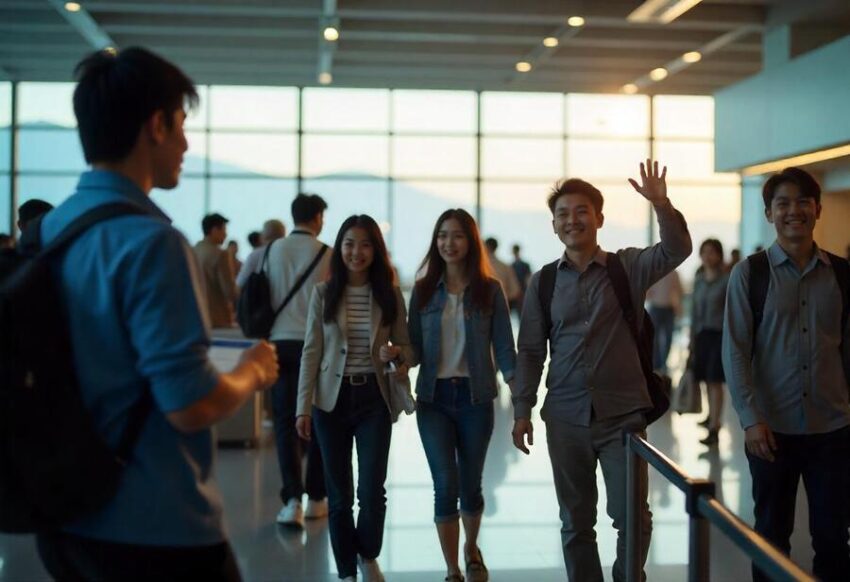Korean Tourists Enjoy Streamlined Entry to Japan Amid Enhanced Relations

Starting today, many South Korean tourists traveling to Tokyo and Fukuoka will find it easier to enter Japan, as they will no longer have to wait in long lines with travelers from other countries. This change is expected to significantly reduce entry times.
In celebration of the 60th anniversary of diplomatic normalization between South Korea and Japan, the two countries will pilot exclusive entry lanes for each other's citizens at four airports throughout June. The designated airports include Gimpo and Gimhae in South Korea, and Haneda and Fukuoka in Japan.
Short-term tourists who have visited the other country at least once in the past year will be eligible for this streamlined process. South Korean travelers using Korean Air or Asiana Airlines can pre-register through Japan's online entry service, 'Visit Japan Web,' and then use the dedicated lanes upon arrival. By simply showing a QR code from the Visit Japan Web to the staff at the exclusive entry point, they can expedite their entry. Frequent travelers for business or family visits will also benefit, as their travel history is stored in airport databases, likely leading to quicker processing times.
Previously, South Korean tourists often complained about long wait times at Japanese airports, particularly at Fukuoka Airport, which has been noted for its lengthy entry procedures. In 2017, attendees at a seminar experienced waits of about an hour at Fukuoka Airport. Although this year saw some improvements, travelers still faced long lines alongside other foreign visitors.
Since March 2006, South Korea and Japan have implemented mutual visa exemption measures, and if this new initiative is expanded and formalized, it is anticipated that travel between the two nations will increase.
The need for a simplified entry system has been discussed for some time, particularly by businesspeople who frequently travel between the two countries. Despite suggestions from airlines like Korean Air and Asiana Airlines, discussions stalled following a diplomatic fallout in 2019 after Japan imposed export restrictions in response to a South Korean court ruling on forced labor compensation.
A breakthrough occurred in March 2023 when then-President Yoon Suk-yeol proposed a third-party compensation plan for the forced labor issue, which revitalized tourism between the two nations. According to statistics from the Korea Tourism Organization, approximately 8.82 million South Koreans visited Japan last year, while around 3.22 million Japanese visited South Korea, totaling over 12 million trips.
The dialogue surrounding the need for simplified entry procedures gained momentum among officials and experts in Japan, emphasizing that improved political relations should translate into tangible benefits for ordinary citizens.
A pivotal moment came during the 'Korea-Japan New Cooperation Vision Forum' held in May 2022, co-hosted by the Ministry of Foreign Affairs and the National Diplomatic Academy. This 1.5-track meeting brought together government and private sector experts to discuss future directions for Korea-Japan relations.
During the forum, participants, including Deputy Minister of Foreign Affairs Jeong Byeong-won and Dongseo University President Jang Je-guk, proposed the idea of creating a Korea-Japan version of the Schengen Agreement, which would simplify entry procedures between the two countries. The Schengen Agreement, established in 1985, allows citizens of member countries to travel freely without passports.
Jang emphasized that if special measures, such as dedicated entry lanes for South Koreans, were implemented, it would enhance the public's perception of improved Korea-Japan relations. The Ministry of Foreign Affairs, under Minister Cho Tae-yul, has established a task force to commemorate the 60th anniversary of diplomatic normalization, and Deputy Minister Jeong has expressed a commitment to actively consider these proposals.
The discussions around simplifying entry procedures have gained traction within both governments. On September 6, 2024, President Yoon and Japanese Prime Minister Fumio Kishida agreed to actively seek ways to enhance human exchanges, including simplifying entry processes. President Yoon stated that if both nations work together, they could mark the 60th anniversary of diplomatic normalization with a significant leap forward in relations.
The implementation of simplified entry measures, initially planned for January 2023, faced delays due to various political hurdles, including President Yoon's controversial emergency measures in December 2022. Concerns from legal authorities in both countries about potential increases in cross-border crime also contributed to the hesitance.
The simplification of entry procedures is seen as a potential foundation for a Korea-Japan economic community, as proposed by SK Group Chairman Chey Tae-won. The success of this pilot program and its potential expansion will depend on the new government's policies towards Japan, set to be unveiled on June 4. Regardless of who becomes president, there is hope for proactive measures that will allow citizens of both countries to visit each other more easily and foster a forward-looking relationship.
What do you think?
0 reactions





